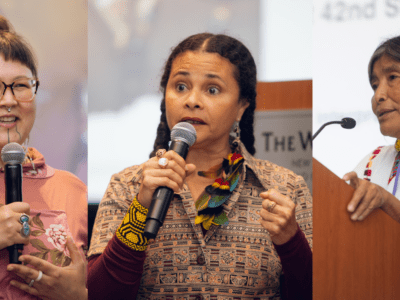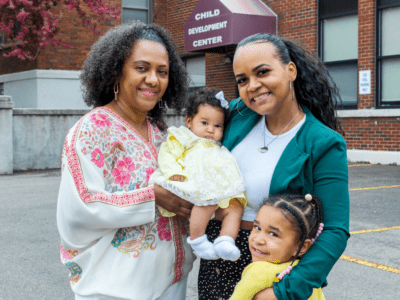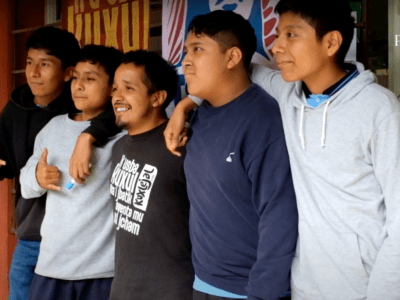On June 12, La June Montgomery Tabron, president and CEO of the W.K. Kellogg Foundation (WKKF) delivered the commencement speech to the UCLA Fielding School of Public Health. The following is a video and transcript of her remarks.
Thank you, Dean Brookmeyer.
My thanks to the board and executive leadership of UCLA and the Fielding School of Public Health for the invitation to speak with you. Thank you to the friends and family of graduates for joining this celebration.
And finally, congratulations to the class of 2020!
I wear this mask in honor of you and your aspirations — and in solidarity with communities everywhere right now.
I am going to remove my mask because I would like you to see my face.
I wish I could see yours. Because today is not just any day, and this commencement speech is not just any commencement speech.
We are in a moment where seeing each other has never been more important. At this point in time — when we have witnessed the brutality of structural racism in the death of George Floyd and others — leaders need to arise from every circle, stand together and speak to our common humanity.
We have work to do — and I believe that’s why we were destined to come together.
Several years ago, you chose public health as your profession. Who knew at the time that when your graduation day came the world would have experienced this level of disruption … and we would be three full months into a historic public health crisis.
You are either prophetic or you were chosen to be here at this moment.
My path to this moment started 33 years ago, when I went to work for the W.K. Kellogg Foundation:
- A philanthropy founded on principles in line with community-based public health approaches;
- A foundation whose DNA is grounded in community engagement, racial equity and leadership;
- A foundation that chose me to be the first woman and African American to lead the organization and carry on the bold legacy of its founder Will Keith Kellogg.
And today, as president and CEO of the Kellogg Foundation, I have the honor of sharing our lessons related to public health — lessons from 90 years of community partnerships and investments.
Oprah Winfrey once said, “I believe there’s a calling for all of us. I know that every human being has value and purpose. The real work of our lives is to become aware, and awakened. To answer the call.”
So, in the midst of COVID-19, as health disparities have been laid bare, and social systems have failed communities and families, I bring a call to you:
The world needs your expertise and your leadership.
Fortunately, you have been equipped for this moment by an esteemed university. You have many shoulders to stand on. You have access to an abundance of knowledge and research to tap into. Added to that, you have the benefit of your profession’s perspective.
You recognize that the outcomes today are the result of systems designed to produce exactly what we are seeing.
Through your own research, training and service in pursuit of your public health degree, you know that the health and economic systems in place now have always worked for some but definitely not for all.
In fact, this knowledge — grounded in research on the social determinants of health that our grantees and partners helped to generate — has guided our work at the Kellogg Foundation for decades.
But knowledge alone does not produce lasting change, as we have learned. This work requires collaboration, public/private partnerships, community engagement and especially leadership.
At the end of the day, it’s the “will” to get it right that drives real change.
And if awareness of a problem is the prerequisite for “will,” now is our moment.
On behalf of the W.K. Kellogg Foundation, I ask you to step boldly into your new profession, to take the reins with confidence and to lead us into an equitable future.
You are the essential community leader we need — to re-imagine and to build community based-public health systems for the future. It is time to accelerate this work to eliminate racial disparities across the nation and the world.
As you begin your post-graduate leadership journey, I offer four (4) lessons from grantees gathered over 90 years.
Their collective experience suggest how to walk this path — what works, what scales up into wider change and, perhaps most importantly, what doesn’t.
- The first and most important lesson is to start with community engagement.
Leaders must be able to convene local residents from many sectors and ethnicities to develop and implement community-based solutions.
Mr. Kellogg referred to this as cooperative planning, intelligent study and group action, and believed it was the only way to effect lasting, sustainable change. Our grantees and partners have proven that many times over.
- The second lesson is to recognize our shared fate and mutual interest in health systems that keep everyone safe and well.
If the current pandemic has illustrated anything, it’s that we are inextricably tied to one another.
As public health leaders, you understand that individual health is tied to community health. Now there is a growing awareness that the stability of a society — and its economic viability — are tied to health as well. If we are to maintain a national and global economy, we must care about health outcomes and access to health for all our citizens.
- A third lesson for leaders, one especially visible right now, is that zip codes matter in health outcomes — when they shouldn’t.
We have watched areas of concentrated poverty struggle to contain the spread of the virus. That represents a disconnect between resources and vulnerable communities.
Areas of vulnerability require more resources, not less. These are the communities that need wider access to the innovations keeping other people safe right now — innovations like telemedicine and food delivery. Public health leaders like you must lead the data analysis that supports the need — and convene other leaders and public servants to design targeted responses that keep the most vulnerable communities safe and well.
- Finally, the fourth thought I have is a point of view — one that has evolved over 90 years of learning from Kellogg Foundation’s work. Racial inequality is the root cause of disparities we’re seeing in every aspect of the public’s health.
Racialized systems, whether intentionally or unintentionally structured, create the disparities we see all around us. The systems that determine housing, education and financial services are producing the same wide gaps as we’re witnessing in the health system.Health policy in the future must be designed with a racial equity lens so that it works for all, not some of the public.
Today too many of the “essential” jobs are at the lower end of the pay scale, and people of color occupy most of them. If they are essential, let’s not treat them like they’re expendable. Let’s make sure that “essential” means greater pay, greater benefits, greater care for the workers, their families and communities.
Our leaders — in every circle, large and small, need to commit to building equitable systems. The time we are living through demands that of leaders in public office, institutions and corporations.
And you must be that kind of bold and courageous leader. Whether you lead at the local, regional or national level, you can commit to re-imagining the systems that will advance racial equity and safeguard public health — and then building them.
Let me be the first to welcome you back to your communities and wish you much success on the front line leading significant improvements in public health — for the future of our nation and the world!
You are the “essential” leader of the future.
Congratulations!





Comments